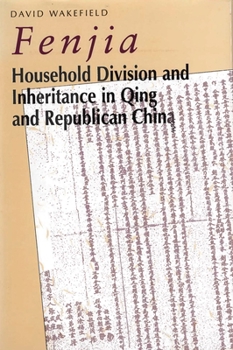Fenjia: Household Division and Inheritance in Qing and Republican China
The division of household property in agricultural societies lies at the centre of the transmission of economic control from one generation to the next. In assembling a body of data concerned with fenjia (household division) in Qing and Republican China, this text investigates one of the central topics in understanding how Chinese society functioned and continues to function. In his presentation of case studies of household division, the author determines that equal division was the rule, yet living parents and single siblings had property rights as well. Variations in inheritance orientations had dramatic effects on landownership patterns, lineage property patterns, lineage strength, class formations and even on state efficiency and its influence on village society. The text explores social class, women and the nuclear family, family documents and law in order to weave the different traditions into a vision of how inheritance, family, lineage and state interacted over the course of Qing and Republican China.
Format:Hardcover
Language:English
ISBN:0824820924
ISBN13:9780824820923
Release Date:September 1998
Publisher:University of Hawaii Press
Length:272 Pages
Weight:1.20 lbs.
Customer Reviews
0 rating





